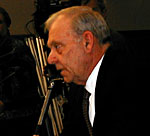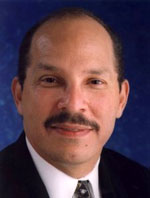By Tom Scheck
Minnesota Public Radio
November 29, 2001
|
| RealAudio |
Twins President Jerry Bell told a tripartisan stadium task force that a new stadium may increase the team's chances of surviving contraction. Major League Baseball Commissioner Bud Selig says he wants to eliminate two teams before the start of next season. He hasn't named the teams, but the Twins and Montreal Expos are widely considered the top Candidates. In addition to Bell's testimony, the task force also listened to several stadium proposals.
| |
|
|
|
||
Bell repeated the same story he's told state lawmakers for five years, but this time he says he wasn't coming to the Legislature to ask for help. He told the 18-member group that he testified at their request and was merely explaining the team's finances. He says the Twins rank near the bottom of the league in revenue and far below the League average in player salaries.
But Bell also provided a glimmer of hope for Twins fans who have feared the Twins will be cut by the end of the year. When a task force member asked him if the Twins would be saved if baseball delayed contraction for a year and a new stadium was built, Bell said it was a possibility.
"Assuming that contraction does not occur prior to the beginning of the seaon and assuming the Twins are one of the teams that would be contracted, which has not been answered, I think the answer to that question is yes," Bell said.
Bell's reply was the first concession from the Twins or Major League Baseball officials that a new stadium could make an impact on the league's decision on which teams would be eliminated.
After Bell's testimony, the task force listened to six plans that could help keep the team in the state.
St. Paul Mayor Norm Coleman and St. Paul Mayor-elect Randy Kelly are pushing a plan that splits the cost of a 375 million facility between private businesses, including the Twins, and the city. They say the city would pay for its share with a 3 percent sales tax on bars and restaurants, game day parking revenues and a ticket tax.
| |
|
|
|
||
"I think we have a very specific proposal. I think St. Paul can, in fact, be the place in which a ballpark could be built and I think the Twins could come here. I think we stand the best chance of getting a proposal adopted and the best chance of getting it funded," Mayor-elect Kelly said.
Kelly says he thinks the City Council would approve the plan if the Legislature gave the go-ahead. He says he isn't sure if he'd bring the proposal up for a city-wide referendum. St. Paul voters defeated a half-cent sales tax increase in 1999 that would have helped pay for a new stadium.
Minneapolis Mayor Sharon Sayles Belton and her successor, R.T. Rybak, also proposed a $315 million ballpark. They say it would be paid for mostly with private money and a one-third public contribution.
Rybak, who opposed public subsidies for a ballpark during his mayoral campaign, repeated his belief that the private sector should pay for most of the stadium.
The task force also listened to stadium proposals that would transfer ownership of the Twins to the public through a sale of team stock. Another asks the state to allow Canterbury Park to operate slot machines. Supporters say a slot machine tax would go to stadiums and other needs.
Sen. John Marty, DFL-Roseville, who is opposed to using public money for stadiums, said the Twins and Major League Baseball should pay for the stadiums entirely with private money. He says there's too large of a disparity between small market and large market teams for a ballpark to make a difference.
"Regardless of what the other proponents of the other plans have said, their plans will put taxpayers on the hook for large amounts of money and they simply don't address the economic problems," Marty said.
Finance Commissioner and task force member Pam Wheelock wouldn't call any of the proposals front-runners. But the former Norm Coleman aide said the St. Paul plan offered more information than the others.
"Based on what we heard today, I think they're more concrete in what their role will be and how the facility will be financed but perhaps not as concrete on what site and what the end product is," Wheelock said. The task force plans will hold its next hearing in Alexandria on Thursday.
More from MPR

